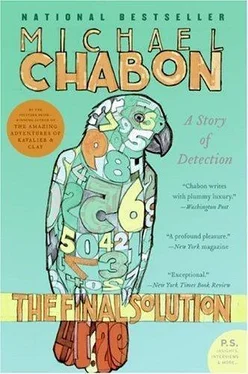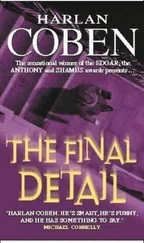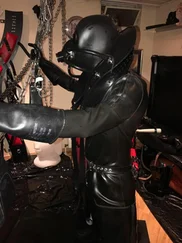The boy drew back, studying her while she dabbed at her eyes. She was absurdly touched to see how concerned he looked. He patted her hand as if he wanted her to pay particularly close inspection to what he had to say next. Then he scrawled four more words on his little pad. Mr. Kalb examined them with a frown. The boy's writing was atrocious, rudimentary. He reversed letters and even words, especially on those rare occasions when he tried to communicate in English. Once he had greatly discomfited her husband with a written query reading WHY DOG OV KRISCHIN DON'T LIKE JUDISH SDIK?
" 'Ask the old man,' " Mr. Kalb read.
"What on earth should I ask him?" said Mrs. Panicker.
Only once before had she seen the old man, in 1936, at the railway station, when he had emerged from his bee-crazed hermitage to meet five enormous crates sent down to him from London. Mrs. Panicker was bound for Lewes that morning, but when the old man shuffled onto the southbound platform, accompanied by the strapping eldest son of his neighbor Walt Satterlee, she crossed over to get a better look at him. Years and years ago his name-itself redolent now of the fustian and rectitude of that vanished era-had adorned the newspapers and police gazettes of the empire, but it was his more recent, local celebrity, founded almost exclusively on legends of his shyness, irascibility, and hostility to all human commerce, that drew her across to his side of the platform that morning. Thin as a whippet, she had later reported to her husband, with something canine, or rather lupine, in the face as well, the heavy-lidded eyes intelligent and watchful and pale. They took in the features and furnishings of the platform, the texts of the posted notices, the discarded end of a cigar, a starling's ragged nest in the rafters of the overhanging roof. And then he had trained them, those lupine eyes, on her. The hunger in them so startled her that she took a step backward, striking her head against an iron pillar with such force that she later found crumbs of dried blood in her hair. It was a purely impersonal hunger, if such a thing there was-and here her report to Mr. Panicker faltered under the burden of his disapproval for her "romantic nature"-a hunger devoid of prurience, appetite, malice, or goodwill. It was a hunger, she decided later, for information. And yet there was liveliness in his gaze, a kind of cool vitality that was nearly amusement, as if a steady lifelong diet of mundane observations had preserved the youthful-ness of his optic organs alone. Stooped in the manner of tall old men, but not bent, he had stood in the full April sunshine wrapped in a thick woolen Inverness, studying her, inspecting her, making no effort to conceal or dissemble his examination. The cloak, she remembered, had been heavily patched, with total disregard for pattern or stuff, and darned in a hundred places in a motley spectrum of colored thread.
Presently the train from London had pulled in, disgorging the great crates, punched with round holes at regular intervals, and stamped with the gentleman's antique name. Clearly visible on the side of each crate was the stenciled address of a city in Texas, U.S.A. Later she learned that they had contained, among other outlandish items, heavy trays packed with the eggs of a variety of honeybee hitherto unknown in Britain.
Mr. Panicker's reply, when she finished her account, had been a characteristic one.
"I am sorry to learn that our good English bees are insufficient to his purposes," he had said.
Now she was sitting beside him, in a back room of the town hall. Through the lone window from the vacant lot beyond there radiated as if drawn by the old man himself the murmur of bees, insistent as the stifling afternoon itself. The old man had been stoking and sipping at his pipe for the last fifteen minutes as they awaited the prisoner. The smoke of his tobacco was the foulest that she, a girl raised in a house with seven brothers and a widowed father, had ever been obliged to inhale. It hung in the room as thick as sheepshearing and made arabesques in the harsh slanting light from the window.
As she watched the vines of smoke twisting in the sunlight, she tried to picture her son as he went about the business of murdering that fine, vital man. Nothing that she saw in her imaginings wholly persuaded her. Mrs. Panicker, nee Ginny Stallard, had seen two men killed, on different occasions, during her girlhood. The first was Huey Blake, drowned by her brothers in Piltdown Pond during a semi-friendly bout of wrestling. The other was her father, the Reverend Oliver Stallard, shot at Sunday dinner by old Mr. Catley after he went off his head. Though all the world blamed her black husband for the unstable character of her one and only son, Mrs. Panicker suspected that the fault lay squarely with her. The Stallard men had always been blackguards or misfortunates. She was almost inclined to view the fact that it was taking Reggie so long to be brought up from the cells as yet one more example, though heaven knew none was needed, of her son's poor character. She could not imagine what was keeping him.
The sudden touch of the old man's dry fingers on the back of her right hand made her heart leap in her chest.
"Please," he said, with a glance at her fingers, and she saw that she had taken off her wedding ring and held it pinched tightly between the thumb and first. Clearly she had been tap-tapping the ring against the arm of her chair for quite some time, perhaps from the moment she sat down in the waiting room. The sound of it echoed dimly in her memory.
"I'm sorry," she said. She looked down at the spotted hand on hers. He removed it.
"I know how difficult this must be," he said, and smiled in a reassuring way that was, surprisingly, reassuring. "Mustn't despair."
"He didn't do it," she said.
"That remains to be seen," the old man said. "But so far, I confess, I am inclined to agree with you."
"I have no illusions about my son, sir."
"The hallmark of a sensible parent, no doubt."
"He took a disliking to Mr. Shane. It is true." She was a truthful woman. "But Reggie takes a disliking to everyone. He can't seem to help it."
Then the door opened, and they brought poor Reggie in. There was a plaster on his cheek, and an oblong welt across his left temple, and his nose looked too big, somehow, and all purple across the bridge. She experienced the false realization that these injuries had befallen him during his fatal struggle with Mr. Shane, and the fleeting hope of a claim of self-defense darted through her thoughts before she remembered having overheard Detective Constable Quint tell her husband that Shane was killed from behind, by a single blow to the head; there had been no struggle. A look at the faces of the policemen, eyes steady on the corners of the room as they handled Reggie to the empty chair, and the true realization set in.
The old man rose and jabbed the air with the stem of his pipe in the direction of her son.
"Has this man been harmed?" he said, his voice thin even to her ears, petulant, as if there were a kind of moral obviousness to the beating her son had been given by the police that trumped any craven protest he or anyone might register. The horror of it vied in her thoughts with a low rough voice whispering Had it coming. Had it coming now a very long time. It took all of her powers of self-possession- a considerable resource, strengthened through a lifetime of nearly continuous exercise-to refrain from crossing the room and taking his battered dark head in her arms, if only to smooth the disorder of his thick black mat of hair.
The two policemen, communicants of Mr. Panicker, Noakes and Woollett as she at last succeeded in putting names to them, stood blinking at the old man as if there were a bit of breakfast clinging to his lip.
Читать дальше
Конец ознакомительного отрывка
Купить книгу












